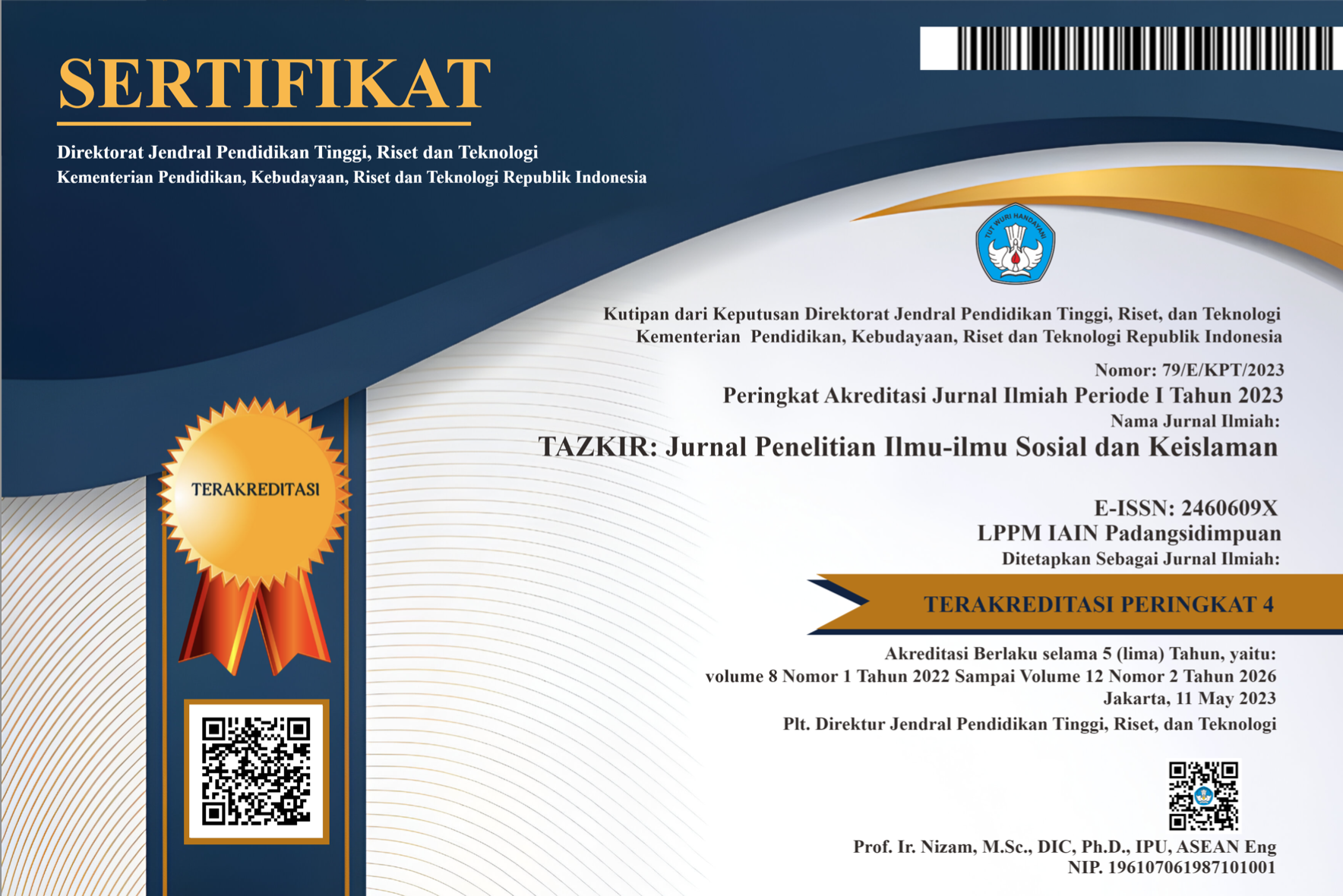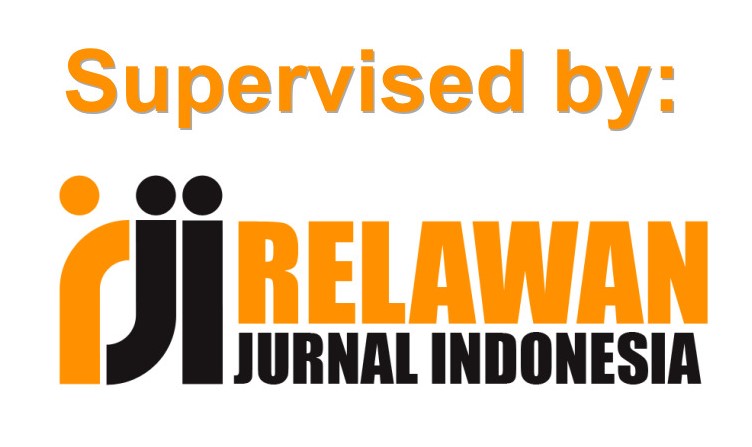The Role of Women in Supporting the Economic Condition of the Poor: An Analysis of Gender Issues on Farming Families
Abstract
Basically everyone agrees that women and men are different. Women and men in the household are generally subject to the division of labor. This division of labor led to the development of limited social roles for both sexes and the creation of power differences in some respects that were more favorable to men. This role is seen in poor families in Padang Bolak Tenggara District. Thus, research was carried out to find out more about the role of women in supporting the economy of poor households in farming families in the District of Padang Bolak Tenggara, the profile of women (farmer's wives) who worked, the time spent required by farmers' wives, and what gender issues arose due to the involvement of the farmer's wife in supporting the family's economy. This paper is a gender perspective. The essence of gender perspective research is a study that clearly seeks to express women's experiences and gender relations according to a central issue that needs attention. Data collection methods using observation and interviews. In conducting data processing and analysis, researchers use Harvard analysis techniques. This technique is often referred to as Gender Framework Analysis (GFA), which is an analysis used to look at the gender profile of a social group and the role of gender in development. Based on observations in the District of Padang Bolak Tenggara of the farming family, it is known that the farmer's wife is very involved in helping the family economy. The profile of women (farmers' wives) in the District of Padang Bolak Tenggara can be seen from the average age of 40-50 years, 65% have a junior high school education background, only 3 people who have makeup/salon and sewing skills, besides farming. The intensity of time spent by women (farmer's wives) working outside is quite high at around 8-10 hours per day. This still does not include homework, i.e. doing homework and caring for children. This makes the workload and working time span of farmer's wives much longer than men. Thus, the gender issue that arises is injustice in the division of labor.
Full Text:
PDF [ENGLISH]References
Badan Kependudukan dan Keluarga Berencana Nasional. (2002). Analisis Gender. BKKBN Pusat.
Bhasin, K. (2006). Menggugat Patriarki. Bentang Budaya.
Budiman, A. (2005). Pembagian Kerja Secara Seksual: Sebuah Pembahasan Sosiologis tentang Peran Wanita di dalam Masyarakat. Gramedia.
Handayani, T. S. (2017). Konsep dan Teknik Penelitian Gender. UMMPress.
Harahap, H., & Siregar, H. D. (2019, June 29). Peran istri petani penggarap kebun karet di Desa Sinunggam Julu [Personal communication].
Harahap, I., & Siregar, K. (2019). Petani penggarap di desa Aek Bayur [Personal communication].
Harahap, R. (2019, August 4). Peran istri petani penggarap kebun karet di Desa Sinunggam Jae [Personal communication].
Harahap, T., & Siregar, P. H. (2019, August 24). Peran istri petani di Desa Siunggam Tonga [Personal communication].
Hasan, R. (1990). Teologi Perempuan dalam Islam. Jurnal Ulumul Qur’an, 1(1), 51.
Lestari, R. E., Santoso, I., & Sulastri, D. R. (2007). Kontribusi Wanita dalam Agribisnis Gula Semut di Kabupaten Blitar Propinsi Jawa Timur. Jurnal Penelitian Ilmu-Ilmu Sosial, 9(1).
Lindsey, L. L. (1990). Gender Roles a Sociological Perspective. Prentice Hall.
Lips, H. M. (1993). Sex & Gender an Introduction. Mayfield Publishing Company.
Mariun, N. B. (2004). Kontribusi Perempuan pada Peningkatan Pendapatan Rumah Tangga Miskin: Studi Kasus di 4 Kabupaten/ Kota. Warta Demografi, 43(3).
Mosse, J. C. (2007). Gender dan Pembangunan. Pustaka Pelajar Offset.
Nasution, K., Harahap, S., & Siregar, D. (2019, September 22). Peran istri petani penggarap kebun karet di Desa Aek Bayur [Personal communication].
Nawal, S. L. (2011). Perempuan dalam Budaya Patriarkhi. Pustaka Pelajar.
Puspa, I. A. T. (2008). Kedudukan Wanita dalam Agama Hindu: Normatif dan Realitas. Jurnal Raditya, 40(1).
Rahmawati, I. (2013). Modul Analisis Gender. The Asia Foundation.
Siregar, E. A., Siregar, S. B., & Siregar, F. (2019, July 23). Peran istri petani penggarap kebun karet di Desa Aek Bayur [Personal communication].
Sudarta, W. (2017). Pengambilan Keputusan Gender Rumah Tangga Petani Pada Budidaya Tanaman Padi Sawah Sistem Subak di Perkotaan. Jurnal Manajemen Agribisnis, 5(2), 59–65. http://download.garuda.kemdikbud.go.id/article.php?article=855552&val=5806&title=PENGAMBILAN%20KEPUTUSAN%20GENDER%20RUMAH%20TANGGA%20PETANI%20PADA%20BUDIDAYA%20TANAMAN%20PADI%20SAWAH%20SISTEM%20SUBAK%20DI%20PERKOTAAN
Wibowo, J. B. (2012). Profil Wanita Pedagang Kecil Ditinjau dari Aspek Ekonomi (Studi Kasus pada Tiga Pasar Tradisional di Kota Semarang, yaitu Pasar Gayam, Pasar Damar dan Pasar Mangkang). Seri Kajian Ilmiah, 11(3).
Wilson, H. T. (1989). Sex and Gender: Making Cultural Sense of Civilization. Kobenhavn, Koln: EJ. Brill.
Yuniarti, S., & Haryanto, S. (2005). Pekerja Wanita pada Industri Rumah Tangga Sandang dan Kontribusinya Terhadap pendapatan Rumah tangga di Kecamatan Sukun Malang. Jurnal Penelitian Universitas Merdeka Malang, XVII(2).
DOI: https://doi.org/10.24952/tazkir.v8i1.5284
Refbacks
- There are currently no refbacks.
Copyright (c) 2022 authors

This work is licensed under a Creative Commons Attribution-ShareAlike 4.0 International License.





